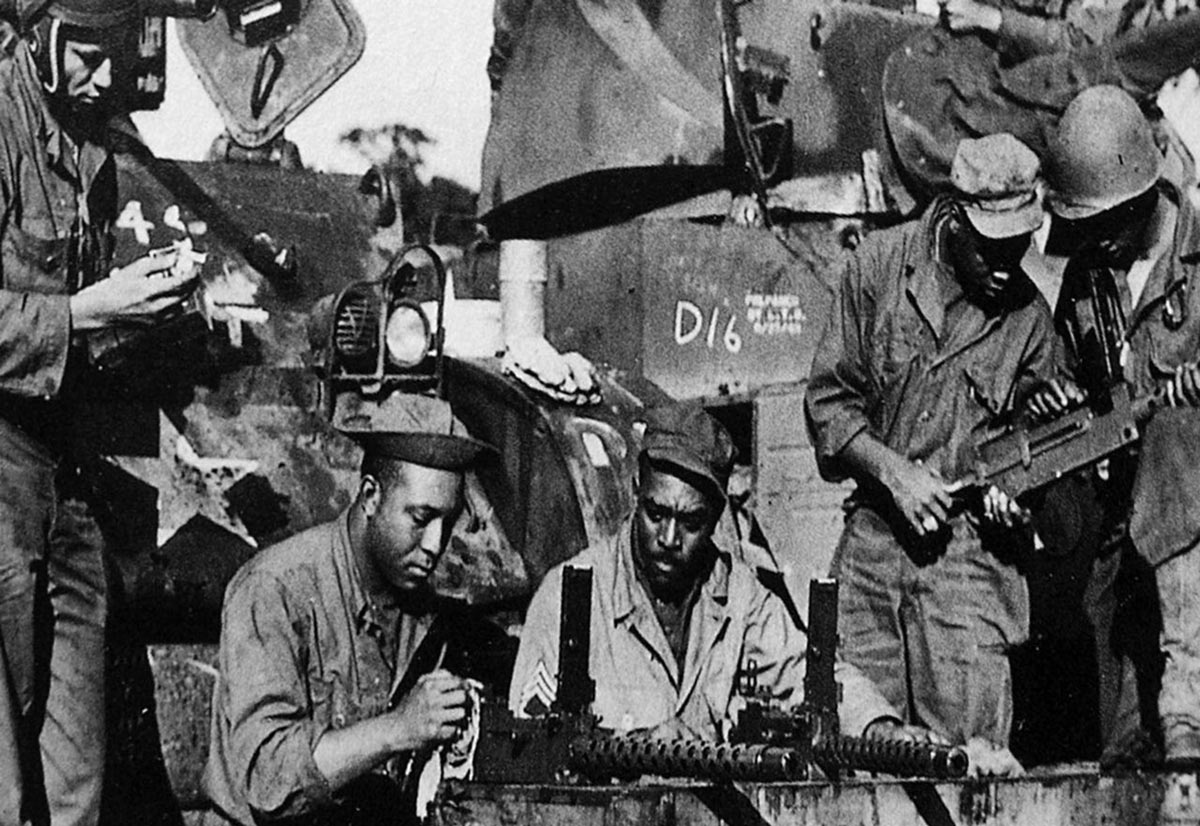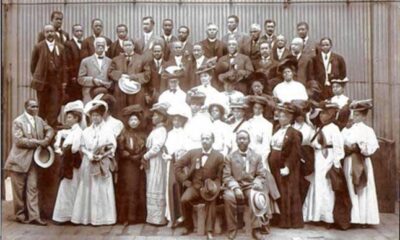Black History
The Black Battalion That Rescued Tony Blinken’s Stepfather

By Steven A. Holmes, CNN
US Army
Editor’s Note: Steven A. Holmes is a veteran journalist who worked at Time Magazine, The New York Times, where he was part of a team awarded the Pulitzer Prize, and The Washington Post before he joined CNN, where he was a member of the Standards and Practices team until retiring a year ago. The views expressed here are those of the author. Read more opinion on CNN.
After he was introduced as Joe Biden’s choice for secretary of state last week, Antony Blinken movingly recounted the story of his stepfather’s survival in the closing days of World War II.
Steven Holmes
His stepfather, Samuel Pisar, spent four years in a Nazi concentration camp. Pisar’s father had been killed by the Gestapo and his mother and sister died in Auschwitz. Samuel, a teenager, escaped from a “death march,” Blinken said, where German troops, retreating from the advancing Allied forces, made starving inmates, mainly Jews, walk miles from Poland to camps in Austria and other places inside Germany. Those who could not keep up were shot by SS guards. Those who did not die on the journey generally were killed when they reached their new camps.
After hiding out in the Bavarian woods, Pisar heard the rumbling of a tank. When he peeked out to see who it was, he was shocked and elated. “Instead of an Iron Cross, he saw a five-pointed White Star,” Blinken said. “He ran to the tank. The hatch opened. An African American GI looked down at him. He got down on his knees and said the only three words he knew in English that his mother had taught him: ‘God Bless America.’”
Blinken’s half-sister Leah Pisar wrote in an op-ed for The Hill in 2018 that the family would later learn the soldier’s name: Sgt. Bill Ellington, who served in the 761st Tank Battalion.
It is, perhaps, one of the great ironies of history that a resourceful Jewish boy fleeing for his life in Poland was carried to freedom by a Black man fighting in a racially segregated army for a country that accorded the soldier little freedom at home. The story of the 761st, a Black fighting force — and one of the very few at the time – is one of perseverance, skill and bravery in the face of doubt and racism.
The 761st was among the most storied Black units of World War II. It overcame harassment and violence by white GIs and civilians at their training camps in the South and had to deal with the skepticism of military brass who didn’t believe Black people could master sophisticated tank doctrine – or, for that matter, serve in any combat roles.
Still, the 761st spearheaded Gen. George Patton’s thrust across the strongly defended Siegfried Line and into Germany; fought at the Battle of the Bulge and was one of the first American units to link up with Soviet forces advancing from the east.
Its 676 enlisted men and 36 officers won 11 Silver Stars, 69 Bronze Stars and about 300 Purple Hearts. Years after the war, President Jimmy Carter awarded the battalion a Presidential Unit Citation for Extraordinary Heroism. One of the battalion’s soldiers, Sgt. Ruben Rivers became one of the first African Americans to win the Medal of Honor for bravery during World War II.
Yet, unlike the famed Tuskegee Airmen, the tankers and their exploits are not widely known. A few books have been written about them, including one, “Brothers in Arms,” by basketball legend Kareem Abdul-Jabbar and Anthony Walton. But none have been bestsellers. And a 1991 public television documentary, “The Liberators,” was enmeshed in controversy and recalled after a five-month review of the film produced no evidence of its claims that the 761st liberated Dachau and Buchenwald. (The documentary filmmakers said they stood by their work.)
Even the unit’s nickname “The Black Panthers,” has been overshadowed. It is less associated with their valiant example of the African American contribution to the Greatest Generation than with a militant Black political party and a comic book superhero.
The 761st, like other Black units, was formed after former First Lady Eleanor Roosevelt, responding to entreaties by civil rights activists, lobbied her husband and military leaders to integrate the armed services. But FDR, not wanting to anger the white Southern Democrats in his coalition, went along with the brass’s view that African Americans could serve only in support roles such as maintenance, transportation and supply– meant for show, not combat. Some Whites referred to the 761st as “Eleanor Roosevelt’s niggers”.
Sent to Camp Claiborne in Louisiana, the men of the 761st were targets of the typical subjugation and humiliation of the Jim Crow South, especially by the White military-police officers and residents of the nearby town of Alexandria.
Tank crews from the 761st Tank Battalion await orders to clean out scattered Nazi machine gun nests in Coburg, Germany, April 25, 1945.
US Army
One day in March 1943, the men had had enough. Responding to the severe beating of two of their comrades in town, and a report that another Black soldier had been killed by racist Whites, a number of the soldiers hopped in their tanks and were heading to town with the intention of shooting up the place.
They were stopped at the gate of the camp by their White commanding officer, Lt. Col. Paul Bates who promised he would look into the situation. “If anything like this ever happens again, I swear I’ll lead you into town myself,” Bates told them, according to Abdul-Jabbar and Walton’s book.
The harassment stopped.
But three months later after the unit was sent to Camp Hood in Texas, it picked up again. One of the 761st’s Black lieutenants, Jack Roosevelt Robinson, was threatened with court-martial after refusing to give up his seat in the front of an Army bus. Once again, Bates intervened and got the charges dropped. Bates’ superiors, however, transferred Robinson to another battalion where the charges were reinstated. He was later acquitted.
The lieutenant’s transfer to the new unit may well have saved his life, since it meant that he was not sent overseas with the 761st, which suffered horrendous casualties. Years later, Robinson, who everyone called Jackie, broke baseball’s color line.
In August 1944, two months after D-Day, the 761st was sent to England. Like many other soldiers and civilians at the time, the men of 761st believed the war would soon be over and that they would not see any fighting. But Patton’s drive toward the German heartland was stalled in the Saar region of northwest France. Patton needed more tanks. He sent for the 761st, telling them, “I don’t care what color you are as long as you go up there and kill those Kraut sons of bitches.”
During the Saar campaign, Sgt. Ruben Rivers was severely wounded when his tank hit a mine. Shrapnel cut his leg to the bone from his knee to his ankle. But Rivers refused a direct order from his superior officer to evacuate, telling him, “This is one order, the only order I’ll ever disobey.”
Rivers commandeered another tank and positioned it to cover the retreat of armor and infantry that were getting mauled by artillery and anti-tank fire. Two enemy shells ripped into his tank, killing him instantly.
All told, the 761st spent 183 consecutive days on the front lines, fighting in France, Belgium, Germany and Austria. They freed 30 towns, four airfields and three large ammo dumps. They captured or destroyed 34 tanks, 113 large guns and thousands of weapons. They rescued fleeing prisoners, like Blinken’s stepfather, liberated the concentration camp Gunskirchen, a sub-camp of Mauthausen, and freed potential Holocaust victims, like the poet Sonia Weitz, who wrote a poem celebrating her rescuers:
“A black GI stood by the door
(I never saw a black before)
He’ll set me free before I die,
I thought, he must be the Messiah.”
The United States, however, did not completely share Weitz’s appreciation. Despite the heroism of units such as the 761st Tank Battalion, the Tuskegee Airmen, the 333rd Field Artillery which played a pivotal role during the Battle of the Bulge or the Black Marines who fought pitched battles against the Japanese on the island of Saipan, decades went by and no Black soldier serving during World War II received the Medal of Honor, the nation’s highest military award.
That oversight was rectified in 1997 – 52 years after the war’s end – when Rivers and six other Black soldiers received the award.
“Today, America is profoundly thankful for the patriotism and the nobility of these men and for the example they set, which helped us to find the way to become a more just, more free nation,” President Bill Clinton said in presenting the medals posthumously. “They helped America to become more worthy of them and more true to its ideals.”
It is, perhaps, these ideals that Antony Blinken sought to invoke with the remarkable story of Samuel Pisar and his Black saviors.



